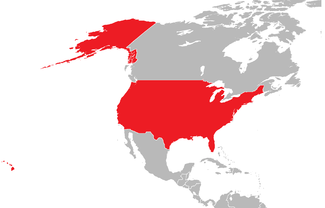
Isolationism means avoiding entanglement in foreign conflicts, particularly foreign wars. It is the opposite of a interventionalist foreign policy. I do agree with Donald Trump that America should not get into "endless wars" that do not serve America's vital interests.[1] I also agree with Trump's policy of not using the American military to "solve ancient conflicts in faraway lands".[2]
Question: Is isolationism growing in the United States?
Growing trend of Americans favoring a more isolationist foreign policy
Consider this: Republicans are the new isolationists; will US retreat from world stage?.
Also: "Their initial data, collected by students conducting individual interviews, surprised Mutz: It found that American adults ages 18-30 tend to favor isolationist foreign policy, regardless of where they fall on the political spectrum, when compared with Baby Boomers, aged 60+"...“At least for the last half of the 20th century, Americans 60 and older were more isolationist than younger adults,” says Mutz, the Samuel Stouffer Professor of Communication and Political Science and director of the Institute for the Study of Citizens and Politics at Penn. “But now things have reversed." - Penn Students Research Which Americans Are Most Isolationist — and It May Not Be Who You Think
As the baby boomers die off and lose power, the USA might become more isolationist.
"I am not an isolationist, but the logic underpinning this grand strategy is not easy to dismiss. Quite the contrary, as President Franklin Roosevelt discovered in the early 1940s, when he had great difficulty countering the isolationists. It is commonplace today to dismiss those isolationists as fools or even crackpots. But that would be a mistake. They were wrong to think the United States could sit out World War II, but they made a serious case for staying on the sidelines…If the case for isolationism was powerful before Pearl Harbor, it is even more compelling today." - Professor John Mearsheimer, University of Chicago, 2014, Source: Mearsheimer Not Worried About Isolationism
United States and the growing trend of onshoring manufacturing
The United States is reshoring its supply chains and producing more things domestically for several reasons and this will give it more security from foreign disruptions.[3] First, due to Covid-19 disruptions in production in China. Furthermore, China is facing an aging populations with a shortage of workers due to their previous One-child Policy. East Asia as a whole with its subreplacement level of births will also face labor problems in the future as well. As a result, America will face a lower risk of its supply chains disruptions due to countries not being able to keep up with demand or foreign powers militarily disrupting its supply chains. The net result of this is the USA will have a lower need to project its power overseas. The USA having less of a need to be the world's supply chain protector and policeman will cause a less globalized economy and more of an emphasis on regional/local economies. See: The Greatest Reindustrialization Process in US History (Video) and A New Wave of Reshoring for US Manufacturers and McKinsey Study: Shortened Supply Chains are Coming
USA's abundant natural resources and geographical defenses makes it easier for it to have an isolationist foreign policy than many nations
USA's abundant natural resources. See: U.S. Natural Resources and The USA is outproducing Russia and Saudi Arabia in oil production. The best is yet to come
USA's natural defenses: Two big oceans and a friendly northern neighbor with a big country to help protect it. In addition, China's and Russia's navies are inferior to the U.S. Navy.[4][5] See: The U.S. Navy is the most powerful navy in the world

George Washington on the danger of foreign entanglements
"It is our true policy to steer clear of permanent alliance with any portion of the foreign world." - George Washington, Farewell Address | Monday, September 19, 1796
Editorial notes: "Washington's admonition to Americans to avoid foreign entanglements stemmed from his own personal experience. He knew first hand how costly wars could be and wanted the young nation to maintain a goal of neutrality with all foreign governments as much as possible. Washington continued his commentary by noting: "so far, I mean, as we are now at liberty to do it; for let me not be understood as capable of patronising infidelity to existing engagements" - Washington still intended for the United States to honor all existing international treaties." - George Washington, Farewell Address, Monday, September 19, 1796
Just War Theory: Jus ad bellum - Is a war just?
Under jus ad bellum, only legitimate authorities can wage war for the right reasons (usually this means a defensive war, or a war of defending the weak against a violent oppressor [6]) and only as a last resort if every other peaceful means to avert war have been used to no avail. A just war can only be waged if there is a serious evil that needs to be stopped. Further there must be a realistic chance that the evil can be stopped without starting a greater evil. If this happens the war reaches a just conclusion. A war started for just reasons and justly waged may still reach an unjust conclusion.
Is the USA becoming more isolationist a good thing?
"I am not an isolationist, but the logic underpinning this grand strategy is not easy to dismiss. Quite the contrary, as President Franklin Roosevelt discovered in the early 1940s, when he had great difficulty countering the isolationists. It is commonplace today to dismiss those isolationists as fools or even crackpots. But that would be a mistake. They were wrong to think the United States could sit out World War II, but they made a serious case for staying on the sidelines…If the case for isolationism was powerful before Pearl Harbor, it is even more compelling today." - Professor John Mearsheimer, University of Chicago, 2014, Source: Mearsheimer Not Worried About Isolationism
"Our foreign policy calls for a direct, robust, and meaningful engagement with the world. It is American leadership based on vital security interests that we share with our allies all across the globe." - Donald Trump, President Donald J. Trump at the United Nations General Assembly: Outlining an America First Foreign Policy
"No man is an island, entire of itself; every man is a piece of the continent, a part of the main. If a clod be washed away by the sea, Europe is the less, as well as if a promontory were, as well as if a manor of they friends`s or of thine own were. Any man`s death diminishes me, because I am involved in mankind." - John Donne (1572 - 1631)
Why the USA foreign policy needs to be less interventionalists
The George W. Bush years had the USA engaged in pointless and costly wars in Iraq and Afghanistan. After the Munich Massacre,
Other essays: The United States
- The United States will be the leading power in the world for the foreseeable future
- Is the USA an economic powerhouse and juggernaut?
- Size of a working age population in a country and its correlation with national GNP in advanced economies. The ability of the United States to attract some of the best and brightest workers in the world
- Top 12 reasons why people are flocking to the USA and leaving the corrupt, authoritarian countries of China and Russia
- The USA is outproducing Russia and Saudi Arabia in oil production. The best is yet to come
- The USA can reduce its national debt. It has done it before
- The citizens of the United States are happier than the citizens of Russia and China. USA! USA! USA!
- The U.S. Navy is the most powerful navy in the world
- Gold reserves by country. The USA is still golden!
References
- ↑ Trump to West Point grads: 'We are ending the era of endless wars', Reuters, June 13, 2022
- ↑ Trump to West Point grads: 'We are ending the era of endless wars', Reuters, June 13, 2022
- ↑
- The Greatest Reindustrialization Process in US History, video
- U.S. Manufacturers Reshoring, But It Will Take A Long Time, Forbes, August 19, 2023
- Firms are bringing production back home because of the Ukraine war, China’s slowdown — and TikTok, NBC News, June 1, 2023
- Reshoring and Restoring U.S. Manufacturing, October 23, 2023
- A New Wave of Reshoring for US Manufacturers
- Trade and Reshoring in the USA, video
- Reshoring Alleviates Supply Chain Issues – But It Needs Tech to Control Costs, eWeek, August 10, 2023
- McKinsey Study: Shortened Supply Chains are Coming
- The Future of Ohio: Manufacturing Growth and Political Shifts || Peter Zeihan
- ↑ Top 10 Navies in the World. Military Today website]
- ↑ Top 10 Most Powerful NAVY In The World 2022, video
- ↑ Proverbs 24:11 and commentaries; see also Psalm 82:4 and Job 29:17.
